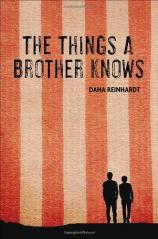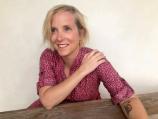Interview: September 2010
Reviewers have been raving for months about award-winning author Dana Reinhardt and THE THINGS A BROTHER KNOWS, which follows a confused teen named Levi Katznelson as he struggles to understand what happened to his brother Boaz, a young marine who recently returned from war in the Middle East. In this interview with Teenreads.com’s Norah Piehl, Reinhardt explains why she decided to write about war in her latest novel, elaborating on her intentions for the book and the stories that inspired it. She also talks about the challenges of writing from a young male’s perspective, speculates on how compulsory service can change attitudes about war, and shares her thoughts about Boaz’s future.
Dana Reinhardt: War is a reality of our time that’s impossible to avoid. It’s there every time you open up a newspaper or turn on the radio. And because I used to live in Los Angeles, I spent a lot of time in my car listening to NPR. I’d hear story after story about soldiers who came home different: changed, absent some essential piece of their former selves. More often than not, I’d hear from the mothers. Occasionally a father or maybe a wife, but mostly it was mothers talking about what the war had done to their sons and their families. And I started to wonder about the younger brother, the one who didn’t go…the one who thought maybe what his brother had done was a big mistake.
So I have LA traffic to thank for this novel. The two things I used to do in the car to keep myself from cursing the traffic gods were: 1) listening to NPR and 2) sitting in silence and thinking about book ideas. Finally, both activities converged.
DR: I worried it would be hard to write from a male point of view because I’m not a male, but really I didn’t find it any different from writing from the point of view of any of my characters, who I also happen not to be. What I found the most challenging was keeping him from sounding too whiny, too sorry for himself.
DR: Service in the Israeli army is compulsory, so joining doesn’t say anything about who you are, or what’s important to you, or how brave or patriotic you are, so there isn’t the same opportunity to judge somebody for his or her choice as there is here in the United States.
DR: I wanted to tell a story about the toll that war takes on everyone, not just the soldiers themselves, but on their parents, grandparents, friends and siblings. The choice to serve, while it still is a choice in this country, is one that has far-reaching effects. I wanted to go deeper into a family story than there’s time for in a radio piece. I wanted to get inside the home and inside the head of a younger brother who didn’t have the convictions and sense of obligation that his older brother did.
DR: Boaz is a good person with solid values. He’s an idealist and just the kind of person you’d want representing your country. So yes, I like to imagine that one of the positive results of his decision was that he served thoughtfully and consciously, even if he came home with some serious problems. And what Levi had to deal with did help him grow up and develop his own world view, but I sort of wish he could have done so on his own time and under less painful circumstances.
DR: I was very close to my brothers when I was growing up, and I still am despite the fact that we’re all five years apart in age. They were mysterious to me in some of the same ways that Boaz is to Levi --- their worlds seemed so far away from mine. And yes, I think there are things that brothers know, but I would add sisters into that equation too. I don’t believe that a brother and a sister can’t be as close as two brothers.
DR: I go for a long walk almost every day. Not anything like what the Katznelson boys do in the book, but typically I walk between four and six miles. I do it because it’s good for you physically, but it also clears the mind; it gives me time to think. Sometimes I listen to audio books or to music. Sometimes I’ll walk with a friend and talk. But often I’ll just walk in silence.
Plus, I live near the Golden Gate Bridge, and most days I’ll walk by the bay toward the bridge and then back toward the city. The beauty is staggering, and I can’t help but believe it’s also good for the soul.
DR: I think before Levi takes this walk with Boaz, his brother is a mystery to him, the same way many older siblings are to their younger siblings. So he didn’t have much to go on beyond the obvious: Was Boaz heartsick? Emotionally ruined? Suffering from some terrible mental illness? In the end, I think, part of Levi’s growth is coming to the understanding that his brother, and people in general, are nuanced and complex, and you have to dig deep and ask questions and know that there are certain things you may never totally understand about somebody else.
DR: It’s an amalgam of several stories I read about, or heard on the radio, or watched in documentaries about the war. Really, there are so, so many painful stories.
DR: I did, yes. Boaz has all the right things going for him: he’s smart and thoughtful, he has the love and support of his family, and he finally comes to understand that he needs help.
DR: No. I still feel the same way about Iraq and Afghanistan, but it did make me feel more deeply for the men and women who serve there --- not that I didn’t feel deeply before, but I hadn’t spent time really living with a family (albeit a fictional one) so profoundly affected by the war.
DR: I think one of the greatest pieces of writing about war is THE THINGS THEY CARRIED by Tim O’Brien, and as you can see, my title is a not-so-disguised tribute to that book. I’d also recommend O’Brein’s IF I DIE IN A COMBAT ZONE, BOX ME UP AND SHIP ME HOME --- another amazing title, don’t you think?
A few more books I’d recommend are A RUMOR OF WAR by Philip Caputo, JARHEAD by Anthony Swofford and CATCH 22 by Joseph Heller.
DR: I have a new book coming out in 2011 called THE SUMMER I LEARNED TO FLY. It's about a girl who hangs out at her mom's cheese store and the boy who collects the day-old bread from the alley, and what happens when they find each other. It's about taking risks, embracing life and searching for miracles, and I’m really excited about it.




